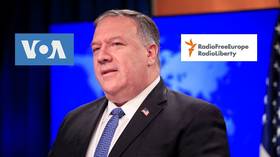Rules for thee but not for me: Pompeo denounces proposed Russian law as ‘burdensome’ limitation on US propaganda outlets

US Secretary of State Mike Pompeo has voiced his opposition to a proposed Russian rule that would require labeling of propaganda content, saying it would burden “independent” information work by outlets such as Voice of America.
“This decree will impose new burdensome requirements that will further inhibit RFE/RL’s and VOA’s ability to operate within Russia,” Pompeo said Monday, commenting on the draft rule published by the media regulator Roskomnadzor.
Pompeo called VOA and its sister outlet Radio Free Europe/Radio Liberty “vital sources of independent news and information for the people of Russia” for “more than 70 years.”
Also on rt.com Liberal media alarmed US propaganda arm Voice of America may ‘become propaganda’ (the wrong kind) under Trump nominee CEOFar from independent, however, they were both established as US propaganda outlets at the dawn of the Cold War. They are fully funded by the government, and the charter of their parent organization – now known as US Agency for Global Media (USAGM) – mandates that they “be consistent with the broad foreign policy objectives of the United States” and “provide a surge capacity to support United States foreign policy objectives during crises abroad.”
The 1948 law that established these outlets outright prohibited their content from being broadcast in the US itself, until the Obama administration amended it in 2013.
The proposed rule would require all content produced by designated “foreign agents” in the Russian Federation to be clearly labeled. When the draft of it was made public last month, acting RFE/RL president Daisy Sindelar protested that its purpose was to “intimidate” her audience and make them “feel like criminals, or believe that they are in danger when they watch or read our materials.”
Yet the Russian regulation is the mirror image of the requirement imposed under the US Foreign Agents Registration Act (FARA) on RT, Sputnik and China Global Television Network (CTGN) since 2017, which only a handful of groups such as the Committee to Protect Journalists (CPJ) condemned as an attack on free speech. The USAGM remained conspicuously silent even as the designated outlets were denied credentials to access government press conferences.
Also on rt.com Twitter labels RT & Sputnik but NOT BBC, NPR & VOA as it launches blitz on state media staff & govt officials
US-based social media companies have also bowed to political pressure and labeled Russian- and Chinese-based outlets as “state-affiliated,” while refraining from using that descriptor for the British Broadcasting Corporation (BBC), German outlet Deutsche Welle, the French AFP, Turkish TRT, or any of the USAGM outlets, once again showcasing the double standard.
Think your friends would be interested? Share this story!












